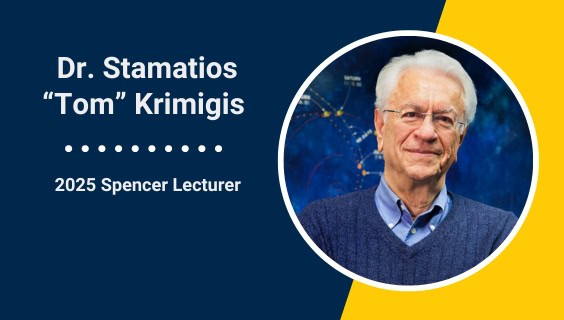
Annual Spencer Lecture Features Dr. Stamatios Krimigis
The U-M Department of Climate and Space is proud to present the 2025 Nelson W. Spencer Lecturer Award to Dr. Stamatios “Tom” Krimigis.

The U-M Department of Climate and Space is proud to present the 2025 Nelson W. Spencer Lecturer Award to Dr. Stamatios “Tom” Krimigis.
On Thursday, March 13, the U-M Department of Climate and Space Sciences and Engineering will present the 2025 Nelson W. Spencer Lecturer Award to Dr. Stamatios “Tom” Krimigis, who is Principal Investigator on NASA’s Voyager 1 and 2. The Spencer Lecture will be offered as part of the U-M Climate and Space Seminar Series at 3:30pm Eastern on Thursday, March 13, and a reception will follow.
Dr. Nelson W. Spencer became the director of the U-M Space Physics Research Laboratory in 1948 and remained its guiding force until 1960. During his tenure, SPRL established itself as a prominent leader in the exploration of the Earth’s upper atmosphere. Dr. Spencer believed in the importance of including science goals in all space flight missions, and was a pioneer in America’s space science program. Each year, a special guest speaker is invited to the Climate and Space Sciences and Engineering Department to present a lecture in Dr. Spencer’s honor.
The recipient of the Spencer Lecturer Award in 2025, Dr. Stamatios (Tom) Krimigis is Emeritus Head of the Space Exploration Sector at the Johns Hopkins Applied Physics Laboratory (APL), where he led the laboratory from 1991 to 2004. He is also the President of the Academy of Athens, where he occupies the Chair of Science of Space and Applications, has built instruments that have flown to all nine classical planets beginning with Mariner 4 to Mars in 1965 and ending with New Horizons to Pluto in 2015; also the Moon, the asteroid Eros, and the Parker Solar Probe to the Sun in 2018.
He will give a lecture titled “In Search for the Exit from the Heliosphere: The Odyssey of Voyagers 1 & 2, 1977-2025.” The two Voyager spacecraft are, arguably, the most important space science missions of the last century. Designed for a four-year mission to Jupiter and Saturn, they not only explored all four giant planets but also proceeded to cross the boundary between the Heliosphere and the local interstellar medium. Now on their 48th year in space, they continue to explore uncharted waters as their mission is winding down due to diminished power from the Radioisotope Thermoelectric Generator power source. Dr. Krimigis has been Principal Investigator for the Low Energy Charger Particle (LECP) instrument since the program’s inception in 1972, and will narrate the journey and discoveries of this remarkable mission through the solar system and beyond.
With a legacy in the space sciences, Dr. Krimigis is Principal Investigator on NASA’s Voyager 1 and 2 Interstellar Mission to the outer planets and the Galaxy. In 1999, the International Astronomical Union named asteroid 1979 UH as 8323 Krimigis. Krimigis has published more than 640 papers in journals and books with over 28,000 citations, and serves as co-editor of the book Saturn from Cassini-Huygens (Springer, 2009). He was awarded the NASA Medal for Exceptional Scientific Achievement in 1981, 1986, and 2014, as well as over forty NASA Group Achievement Awards for Voyager, AMPTE, Galileo, NEAR, Cassini, MESSENGER, ACE, and more.
Among his recent awards are the Smithsonian Institutions’ National Air and Space Museum Trophy for Lifetime Achievement (2015), the NASA Distinguished Public Service Medal (2016), the Theodore von Karman Award (2017) of the International Academy of Astronautics, and the Distinguished Service Award (2020) of the International Astronautical Federation (IAF). Krimigis is a member of Academia Europaea, and was honored by a special resolution of the U. S. Senate “for exceptional contributions to space science” in 2018.
A video by the Smithsonian features his work.
The Spencer Lecture will be held at 3:30pm ET on Thursday, March 13, 2025, in the CSRB Auditorium on the second floor of the Climate and Space Research Building, followed by a reception in the new Leinweber Innovation Laboratory on the first floor. The event is free and open to the public.
Dr. Krimigis will also give a career talk for students, faculty and staff at 11:00am on Friday, March 14, in the Climate and Space Research Building at the University of Michigan.
For more information, visit: https://events.umich.edu/event/132104